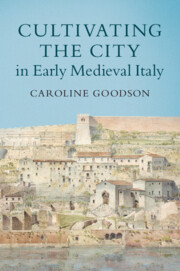Book contents
- Cultivating the City in Early Medieval Italy
- Cultivating the City in Early Medieval Italy
- Copyright page
- Dedication
- Contents
- Figures and Tables
- Acknowledgements
- Terms and Measurements
- Abbreviations
- Additional material
- 1 Urban Gardens and Gardeners
- 2 Patterns and Changes
- 3 The Shape of the Phenomenon
- 4 Alliances and Exchanges
- 5 Values and Ideals
- 6 Conspicuous Cultivation
- 7 Conclusions
- Bibliography
- Index
4 - Alliances and Exchanges
Published online by Cambridge University Press: 08 March 2021
- Cultivating the City in Early Medieval Italy
- Cultivating the City in Early Medieval Italy
- Copyright page
- Dedication
- Contents
- Figures and Tables
- Acknowledgements
- Terms and Measurements
- Abbreviations
- Additional material
- 1 Urban Gardens and Gardeners
- 2 Patterns and Changes
- 3 The Shape of the Phenomenon
- 4 Alliances and Exchanges
- 5 Values and Ideals
- 6 Conspicuous Cultivation
- 7 Conclusions
- Bibliography
- Index
Summary
This chapter considers the economic context of urban food production of the Middle Ages and situates household-scale production within its wider context. It explores the emergence of evidence for urban markets for foodstuffs and suggests ways in which we might understand the absence of that evidence for the period prior to the eleventh century. In the absence of commercial-scale farming of foodstuffs, household-level cultivation was the principal means of acquiring food for most city-dwellers. The possession of food gardens and their exchange through horizontal networks of families or social groups allow us to see the prominence of family links in the management of urban property and the control of urban food production. The systems which emerged to permit the feeding of urban populations in the early part of our period arose in the context of new ideas about wealth, and emerging communities, such as religious households and priestly households, which required new solutions to feeding urban populations.
Keywords
- Type
- Chapter
- Information
- Cultivating the City in Early Medieval Italy , pp. 115 - 155Publisher: Cambridge University PressPrint publication year: 2021

